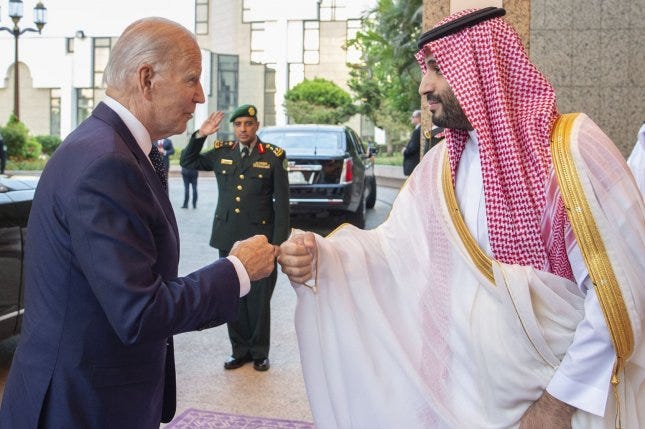As President Biden is forced to compromise in the Middle East, oil takes precedence above human rights.
Despite the careful planning of Joe Biden's Middle East visit, the White House made a big error when the president met Saudi Arabia's crown prince, Mohammed bin Salman, for the first time.
President Biden travels to the Middle East to negotiate a new agreement.
Prior to the departure of Air Force One from Washington, the government claimed that due to a surge in Covid cases, Biden would avoid physical contact and not shake hands, a decision generally believed to help him avoid an awkward picture session with the strong heir to the throne.
The picture of the two leaders leaning in and bumping fists came out as more casual and convivial than the US president obviously intended. Biden into office promising to be tougher on Donald Trump's favorite strongmen and autocrats.
He was particularly hostile to Prince Mohammed, the ambitious 36-year-old who usurped his uncle to become the next in line to the throne, conducted a catastrophic war in Yemen and imprisoned or killed his opponents.
President Biden also brought up the past throughout the conversation.
In the aftermath of the brutal murder of dissident writer Jamal Khashoggi on the campaign trail, Biden threatened to make Saudi Arabia a pariah state. He subsequently refused to communicate directly to the crown prince, instead relying on his ill father, King Salman.
Shortly after taking office, Biden presented US intelligence findings that suggested that Prince Mohammed ordered the operation targeting the Washington Post writer at the Saudi consulate in Istanbul, which Trump suppressed.
When the US president brought up Khashoggi with the de facto Saudi ruler on Friday, the prince reportedly retaliated, accusing Washington of hypocrisy for failing to investigate the killing of Palestinian-American journalist Shireen Abu Aqleh and for allowing inmates at Iraq's Abu Ghraib prison to be abused.
The Presidents' next response
For reasons that no US president can ignore, Riyadh has been one of Washington's closest strategic partners. Biden has heard the siren song of the kingdom's vast oil reserves: the Ukraine crisis has created havoc on global oil markets, and he can no longer refuse the offer.
The president spent three days in Israel and the occupied Palestinian territories before heading to Saudi Arabia last week, delighting Israeli leaders with his forthright commitment to the country's security situation with Iran while disappointing Palestinians by saying the "ground is not ripe" for renewed peace talks.
The President won't wait around for Iran for very long.
Making peace with the enraged leader of a country where honor is prized above all else was never going to be simple. Despite the reservations of many Democratic supporters, who accuse Biden of abandoning a promise to focus his foreign policy on human rights, the president has been compelled to try.
Saudi Arabia has the world's second-largest proven oil reserves and the most sway over oil prices, but Biden left on Saturday without being able to make any substantial pronouncements about raising global oil supplies.
The Saudis would only officially commit to pumping additional oil if there are market shortages, though the president may get more good news at next month's Organization of Petroleum Exporting Countries (Opec) conference.
Is the U.S. ready to pull the plug?
However, Russia's invasion of Ukraine has widened existing cracks in the US relationship with Gulf monarchies, who no longer see Washington as a dependable bulwark against Tehran; the Middle East's petrostates have notably refrained from supporting the Biden administration's efforts to isolate Moscow.
President Biden is urging Arab states to mend ties with Israel in order to join the burgeoning regional military coalition against Iran. Despite American bravado, the Middle Eastern chess pieces are changing, and the US looks to be poised to pull the plug.



